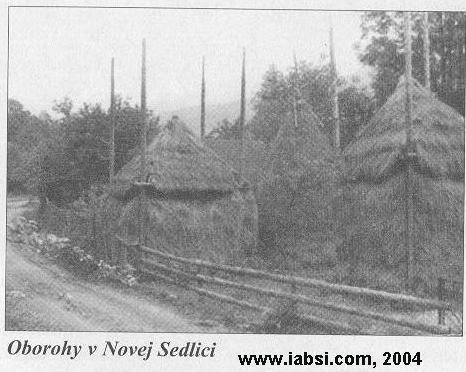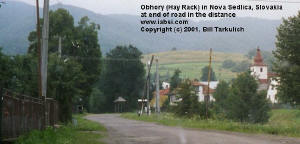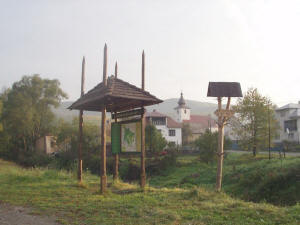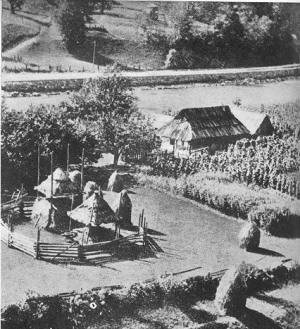| Slovakia Genealogy Research Strategies | ||||||
| Home | Strategy | Place Names | Churches | Census | History | Culture |
| TOOLBOX | Contents | Settlements | Maps | FHL Resources | Military | Correspondence |
| Library | Search | Dukla Pass | ||||
Hayricks (oborohy, abora)
in
Nová Sedlica, Ulič , Prislop and environs

Photo of the Oborohy in Nova Sedlica, Slovak Republic (also called Slovakia). The photo was taken in the 1960's. Source Vasil Fedič. Used with permission.
According to Vasil Fedič, "This unique structure is especially highly regarded and is of the folk style architecture in Slovakia. It exists only in Ulič, Ubľa and the Starina valleys. An „oboroh“ (in Slovak) is a totally straw shelter, that stands on four upright wooden posts, and serves to store hay. Hay is stacked from the fields under the „oboroh“ the shelter and then removed. In 1996 three oborohy remained in the Ulič valley, in Nová Sedlica, Ulič and Prislop. Of those that remain in the Ulič valley, only the one in Ulič is a traditional oborohy. Today one of the oborohy has been converted for use as a tourist information sign in the national park." (The Ulic Valley, 2002)
What I believe is unique about this is two things. First, its roof is made of grass. The second is that this is a very rare structure for the region. These structures are different from conventional haystacks. Most of the haystacks are small, tall and narrow, with hay placed on "hay poles", in the field, made by one person.
It is essentially a structure for storing large amounts of hay. The roof actually slides up and down on the four posts and is locked in place with pegs. The height is adjusted according to the amount of hay underneath.
When I noticed that Hayricks are common in Dutch countries, I began to thinking about some of the old landowners of this region. Here is my correspondence on the matter.
"Stefana Rholl descended from an old Dutch entrepreneur family, which in the 16th century ran a business in Gemer and on Spis (counties), creating efficient ore melting as well as glass, smelter, charcoal burning and other jobs." So I began to hypothesize whether or not this Oborohy was the idea of distant landowners such as RHOLL, since we do not see it anywhere else in the region. We may never know this answer!
 |
You can see the Information sign in the form of a oborohy in the photos above, taken in Nova Sedlica in 2001.
Above is the information sign, in the form of a oborohy, 2005. Thanks to Michael Habler, Germany for the photo.
Hayricks in Hungary
In Hungary, these structures are called "abora." Balassa and Ortutay (1) claim that the name of the structure is Ukrainian name and it has been known since the 16th century. They indicate that the structure was common in Transylvania (Romania) and were used as late as the 1950's. They also indicate that abora are "frequently found along the upper region of the Tisza." Examples of abora still exist in the Hungary village of Gelénes and Szatmárcseke (village links not operational 7/06)
There is some question as to whether this structure found its way here or is indigenous to the region. Balassa and Orurtay go on to say, "There is an illustration of it in a 14 century Czech bible, in the 15 century there is a drawing of one in (unspecified) English writing. In a Czech bible from the 14 century there is a picture. In the new ages (after the middle ages) it was known to be used in Holland, Germany, Baltics, Poland, and Belorus. It seems certain, that the hayracks spread from Western Europe eastward in the middle ages. It was found in northeastern Hungary in the 16-17 century." (translation thanks to "Dr. Joe Q.", Slovak-roots forum.
I would like to hear from anyone willing to comment or contribute to the knowledge of Hayricks/Oborohy/Abora.
Hayricks in Ukraine
One photo of a hayrick from a 1946 book "Under The Carpathians" is shown below. It is believed to be in the Jasina area.
Notes and Sources
(1) "Hungarian Ethnography and Folklore" by Balassa and Ortutay
(2) Haymaking in the Carpathians
(3) Hungary Open-Air Museum, Szentendre, Hungary
Unspecified book by Nikola Sohaj Lupeznik
Other Hayricks found in the Region
Koločava, Ukraine
Skanzen in Humenne, Slovakia
Links to off-site webs will open in a new window. Please disable your pop-up stopper.
Last Update: 15 November 2020 Copyright © 2003-2021, Bill Tarkulich

